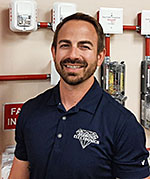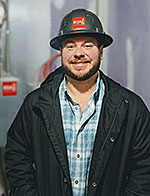In-Building Public Safety Communications (IB-PSC)
NICET in cooperation with the Safer Buildings Coalition (SBC) launched its newest certification program in 2021: In-Building Public Safety Communications (IB-PSC).
"The excitement within the industry around the launch of this program has been truly amazing. We look forward to the certification programs continued growth along with the many benefits this certification will afford all stakeholders involved in the design, installation, inspection and testing of emergency responder communication enhancement systems (ERCES). Having a program that is recognized and respected by the AHJ community is paramount for the safety and wellbeing of our first responders and the public" said Chief Alan Perdue (Ret.) Executive Director – Safer Buildings Coalition
The program has a three-level technician track and a one-level Design track that can be used independently or together to establish minimum qualifications for engineering technicians engaged in the detailing and layout, installation, and maintenance, and/or designing of in-building public safety communication systems. Level I and Design are available now. Level II will be available the first week of January 2022 and Level III later in 2022.
Recently, NICET staff reached out to the first individuals earning certification to ask for their thoughts on the IB-PSC certification.

Merisa Gamler of Riverside, California received NICET’s IB-PSC, Level I certification in November of this year. She is also a NICET-certified Fire Alarm Systems II technician. Merisa currently designs public safety DAS and manages projects at A.J. Kirkwood & Associates, Inc.

Joshua Cole of Concord, North Carolina has been a NICET-certified technician since 2008. He received the IB-PSC, Level I certification in November 2021. In addition to this newly created certification, Joshua holds the certification for Inspection and Testing of Fire Alarm Systems, Level II and is a NICET-certified Fire Alarm Systems IV technician. He is an Operations Manager for Diamond Electronics, Inc.

Raul Pla of Miami, Florida is the first technician to receive the IB-PSC, Level I and IB-PSC, Design certifications. He has been a part of the RF industry for many years and is founder of BDA Systems Co.
1. What is your background? How many years of experience do you have? Where are you currently employed?
Merisa: I started working in the public safety DAS industry at the beginning of 2017. I managed projects across the United States and did everything from helping commission systems, site survey testing, prefabricating materials, and informing AHJ's about these systems and code compliance requirements. In 2019, I had the opportunity to move to California to assist in A.J. Kirkwood's newly developed DAS division. I currently design public safety DAS and manage projects at A.J. Kirkwood & Associates, Inc.
Joshua: I began my career in Florida, eventually moving to North Carolina to continue my studies and career growth. I have almost 20 years in the Fire, Security, and Life Safety industry. I am currently employed with Diamond Electronics, Inc., located in Locust, NC, as Operations Manager.
Raul: I’ve been involved in the RF industry for most of my life. My father, an antenna engineer, founded Antenna World, Inc. in 1988, and I’ve grown up around the business learning about design, manufacturing, and installation of communication antennas. Back in 2010, In-Building Communications began to really pick up steam and that’s when we started to focus on that market. With over 12 years of experience working in the family business, I have a background in antenna manufacturing and design, as well as an MBA and project management training. I am currently employed as a founder of BDA Systems Co.
2. What motivated you to pursue this certification? What value do you see in this certification?
Merisa: My motivation to pursue this certification was to fulfill some of the AHJ's requirements of having a nationally recognized certification in lieu of manufacturer certifications. While I think manufacturer certifications are a must to work on any system, this certification holds a great value by testing your knowledge of the code, installation practices, and additional RF understanding that manufacturers do not provide.
Joshua: We started installing and servicing BDA/ERRCS two years ago. I became passionate after researching and learning how these systems benefit the lives of not only first responders, but also everyday citizens, ultimately resulting in saved lives. Naturally, I wanted to get certified. I think the value of this certification is very important because possessing the knowledge required assures the AHJ and customers that you and your company will oversee the installation of a most essential product that will save lives.
Raul: The In-Building Communications industry is currently lacking adequate standardized licensing and certification. Currently, the only nationwide license and certificate that is required by inspectors is the F.C.C. - General Radio Operator License (GROL), but [that] exam has more to do with amplifiers in the marine industry than In-Building. The value in this certification is the respect and recognition that NICET has among Fire Marshalls. It’s a recognized entity for life safety knowledge testing and having certifications from NICET help prove to Fire Marshalls that I’m qualified to perform this type of work. In doing that, plan review and inspections go much smoother thanks to the peace of mind that I have been validated by a respected third party.
3. How has this certification been helpful?
Merisa: This certification has helped demonstrate that I have the experience I need to understand In-Building Public Safety Communications, as well as design these systems more efficiently.
Joshua: This certification has been very helpful for [me and] for Diamond Electronics in that it earns the confidence and trust of the AHJ and allows the AHJ to lean on us for answers, as this is a new system for some AHJ’s as well. In addition, we were recently awarded a project because of our NICET-certified employees, as well as our reputation for installing and servicing BDA/ERRCS.
Raul: It’s been helpful in the sense of validation of my skillset. Since there’s not much out there to prove my skills and qualifications without actually performing them, this certification has helped me win new business. It has been making my new clients feel more comfortable with signing me on for our first projects.
4. Would you recommend this certification to others?
Merisa: I would definitely recommend this certification to others working in the In-Building Public Safety Communications industry based on the value it holds. As AHJ's requirements are ever evolving, this certification has the potential to become a standard throughout the industry.
Joshua: Absolutely! NICET is one of the highest achievements you can possess in this industry. It is not only well respected by code officials, but it also assures the customers and AHJ’s that you will install a quality system to code, that will save lives. Quite honestly, my career would not be nearly as advanced without NICET certification.
Raul: Yes, this certification is crucial for those aiming to shine in the In-Building Public Safety industry. Having a recognizable third party validate your skillset speaks volumes about the type of knowledge and experience you can bring to a job site.
This program is made possible through the dedication and tireless efforts of the volunteer Subject Matter Experts (SMEs), NICET staff, and support from Safer Buildings Coalition. We can’t thank you enough!
Visit https://www.nicet.org/IB-PSC for more information including the list of participating SME’s and to express interest in helping write Level III exam questions.